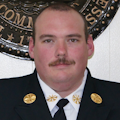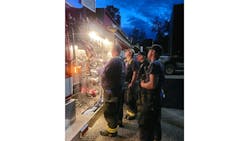What If They Do Respond: Minimum Standards for Today’s Rural Firefighters
We all have seen them: The social media ads that ask, “What will happen if no one responds?” They usually depict a pumper sitting in the middle of the road with an unattended hoseline and a huge fire that’s raging nearby. The overtones are doom and gloom, while trying to recruit new volunteers. This “the sky is falling” message is used to show that departments might not be capable of responding, because they can’t recruit new volunteers.
My question to you is, what if they do respond?
What’s happening?
Myriad communities across the United States are protected by well-trained and well-equipped volunteer firefighters. There also are communities that are protected by untrained and ill-equipped volunteers. For the most part, the latter occurs at no fault of the volunteers, whether it be because of a lack of funding or just simply a lack of know-how.
We, as fire service professionals, know the difference, but the public doesn’t. The public trusts that their first responders are trained and prepared for anything and everything. I compare this with the trust that we place in the pilot of an airplane. We expect that the pilot has thousands of flight hours of experience, with even more time spent in the simulator. Why shouldn’t the public expect the same of their firefighters?
We are tasked with entering the home of strangers and expected to save their property and even the life of a loved one(s). It’s important that we do everything that we can to deserve the public’s trust.
At the very least, there should be a minimum standard within every volunteer fire department. Some states have legislation that sets a minimum standard. For example, Tennessee requires a 16-hour introductory class before a member can respond on an apparatus and an 80-hour basic firefighter/live burn class. Although these requirements are low, they are a good place to start.
Unfortunately, some Tennessee counties petitioned the legislature for an exception to the law, stating that the requirements were too much to expect of volunteers. Although quite a few departments are working to meet the requirements, numerous counties are working to maintain the exemption.
This is the part where you just can’t help but scream. These counties are telling their volunteers that it’s perfectly acceptable to have no minimum standard and to just respond because “all they want to do is help.”
Unfortunately, some departments don’t believe that there’s a problem. They work hard to paint a picture of a high-speed, well-functioning department, when the reality is just the opposite. I admire their positivity, but this simply won’t solve the underlying issues.
Sometimes, admitting failure is the only way to get a department back on track.
What are the expectations?
It’s important for these volunteer departments to understand that the stakes are no different in their little piece of America than they are in the larger, urban areas. True, there isn’t an expectation that all volunteer firefighters are exposed to, for example, the same high-rise rescue training or CBRNE training that’s so common in larger cities. However, volunteers should be expected to train heavily on their bread-and-butter responses, even if this does include the previously mentioned high-rise rescue and CBRNE training.
The public doesn’t know the difference between a firefighter who has thousands of hours of training and one who has 16 hours. They don’t care. They called for an expert, and they expect one to show up. This isn’t to say that formal training means that you get the best. There are plenty of excellent firefighters who have minimal formal training. That said, one thing that formal training does is get you out of your bubble. One of the biggest problems is that some small rural departments can’t or won’t get out of their bubble. Without this, the cycle will continue.
The repercussions
Being the public servant, being the volunteer, being the one who “just wants to help,” never serves as an excuse when everything comes crashing down.
The fire department is by no means immune to criminal and/or civil legal action. Departments that struggle with even the basics, including PPE and apparatus safety, open themselves up for legal ramifications, not only from the public but from their own members. Just imagine what kind of effect that a lawsuit that’s filed by one of your firefighters could have on your department.
Without minimum standards and without some sort of oversight, there always is the threat of crippling legal actions against the department and/or individual members.
Then there’s negligence. It’s our job to be prepared for the worst. Even if you are a small department that has a single pumper that runs 12 calls per year, it’s your duty to perform at a standard that any reasonable person would expect—and those expectations are high. Failure to do so could tie up your department in litigation for years.
If your department isn’t prepared to respond to a simple emergency, it isn’t prepared to answer the prosecutor’s questions.
What can we do?
So, you ask, what can be done to fix this problem?
If you are a rural volunteer that’s struggling to move your department forward, you already took the first step by reading the articles that are on this website. Some of the greatest minds who are in the fire service write articles on tons of different subjects. Learn what you can, use what you can, spread the word throughout your department.
Our wonderful world of social media can be used for more than just the newest funny memes. Tons of training groups, fire chiefs, fire officers and even line firefighters post their experiences and what they do to better their craft. Learn from them, make contact, and start a dialogue. For the most part, they will be more than willing to help you out.
For those of you who are blessed with experience and training, spread the wealth. Instead of cutting down the less fortunate, lift them up. If there’s a department nearby to you that’s struggling, try to lend a hand. Offer to help with a grant application. Extend an invitation to train together. Mentor a young firefighter. You can make a difference.
It’s your job to lead the horses to water. They will decide whether to drink or not.
We always hear that we must leave the fire service better than we found it. Here is your chance. The future of the fire service doesn’t depend on us. It depends on the legacy that we leave behind.
About the Author

Adam Hursh
Adam Hursh has been a member of the fire service for 22 years. He began his career with the Larimer Volunteer Fire Department in North Huntingdon, PA. Hursh currently serves as the deputy fire chief of the Gilt Edge Volunteer Fire Department as well as a full-time lieutenant with the Piperton Fire Department, both of which are in southwest Tennessee. He holds a Master of Public Administration from Columbia Southern University and is designated as a Chief Fire Officer through the Center for Public Safety Excellence.
